While there are many legitimate ways to make money online consistently…
Affiliate marketing is arguably one of the most popular and cost-effective methods for generating passive income.
But, what is affiliate marketing?
Affiliate marketing is the business model where an affiliate earns a commission from selling another person’s or company’s products (physical or/and digital).
If you’re looking to gain more clarity and meaning on affiliate marketing, how it works, and what the benefits are, this article is for you.
You will discover what affiliate marketing is, how it works, and its benefits when it comes to passive income.
Affiliate Marketing Explained
Using the “What – How – Why” approach, here’s what will be covered:
- What affiliate marketing is.
- How it works.
- Why it’s a profitable business model.
So, let’s start with the “what”.
What Is Affiliate Marketing?
Affiliate Marketing Definition
A clear definition of what affiliate marketing is:
Affiliate marketing is the process of earning a commission by promoting other people’s (or company’s) products. You find a product you like, promote it to others and earn a piece of the profit for each sale that you make.
Pat Flynn.
In a nutsell…
Affiliate marketing is a type of business model that allows you to earn a passive income. As an affiliate, you earn a commission for promoting another person’s or company’s products.
These offers can be physical products, services or digital products (like ebooks and software).
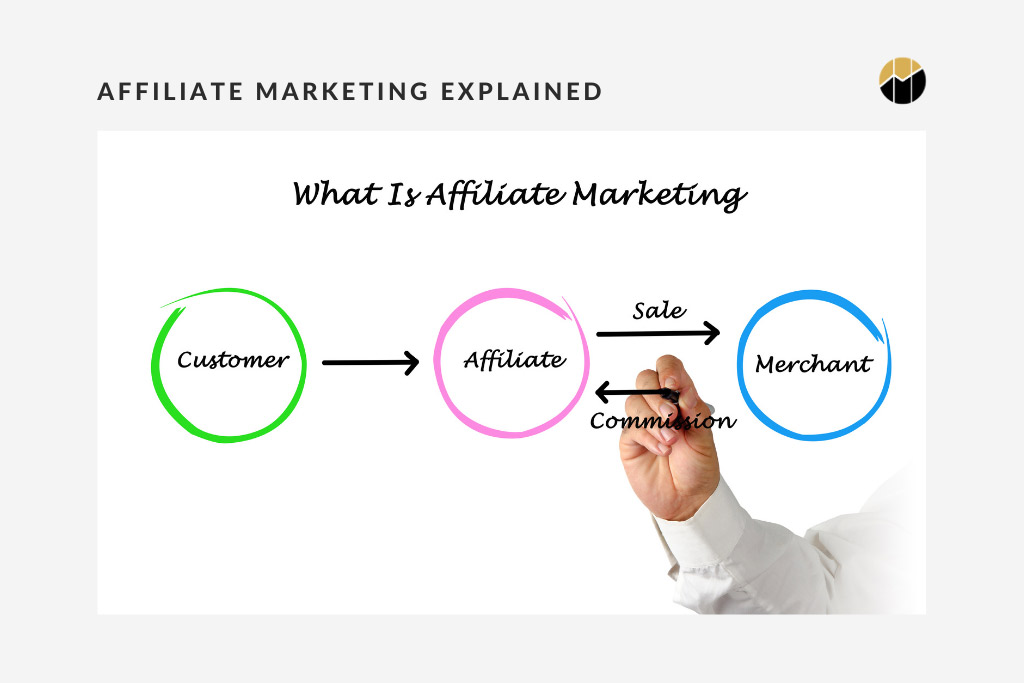
Affiliate Marketing Terminology
Here are a few terms you will frequently encounter and their meaning:
- Affiliate link: a unique trackable link assigned to an affiliate marketer. It contains an ID or username that is used to identify the affiliate. This is typically how the sale can be associated with an affiliate.
- Affiliate commission: the amount that an affiliate gets paid for promoting an offer – usually a percentage of the total sale price that’s set by the person or company’s product you’re promoting e.g. for a product $100, the commission could be 30%, which means you earn $30 for every sale you make.
- Affiliate agreement: this outlines the terms and conditions between a merchant (product owner) and an affiliate. The agreement should clearly mention the deliverables, commission, cookie duration, other terms and conditions, etc.
- Affiliate network or platform: An affiliate marketing platform is a virtual marketplace that connects merchants (a.k.a sellers) and affiliates (a.k.a publishers).
- Affiliate program: the offer provided by a merchant to promote their products using affiliate marketing.
Affiliate Marketing Business Model
Now, let’s move to the “how”.
How Does Affiliate Marketing Work?
For affiliate marketing to work, three different parties must be involved:
- The merchant (also known as seller).
- The affiliate (known as the publisher too).
- The consumer.
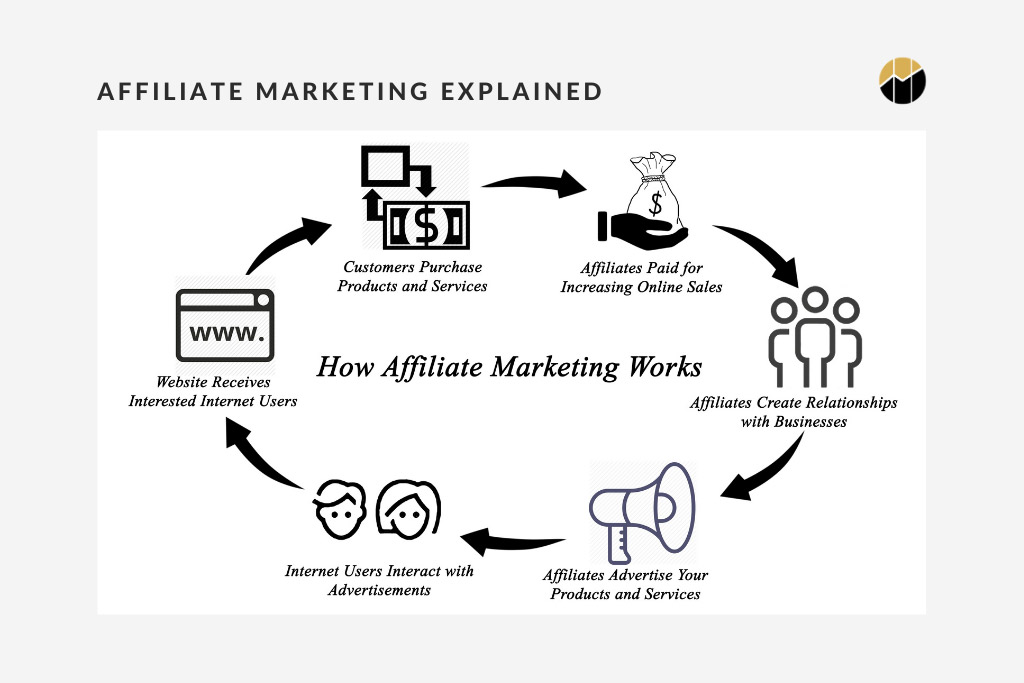
Here’s how the relationship between these three parties work:
1. The Merchant or Seller
The seller can be an established brand, an upcoming startup, or a solo entrepreneur.
The merchant, seller, retailer, or vendor is the party that creates the offer. It develops and/or owns the product. This product or offer can be a digital product, a physical one or a service.
They offer a commission to affiliates in exchange for promoting/selling their product. Sellers can also offer a commission for generating website traffic or leads. (in the How Do Affiliate Marketers Get Paid section below, I’ll dive deeper into this).
When a “conversion” happens, the merchant checks the sales record and the associated cookie to find the affiliate ID. If the cookie contains an affiliate ID, the sale is attributed to the associated affiliate.
2. The Affiliate or Publisher
The affiliate, also known as the publisher, is the individual or company that promotes the merchant’s product to potential customers.
The publisher can promote the affiliate product using their link on their blog, social media accounts, YouTube channel, emailing their subscribers, etc.
But, even the best affiliate marketing program won’t drive conversions in the absence of an engaged audience. It is the affiliate marketer’s responsibility to build this audience of potential customers.
When a consumer buys the promoted product, the affiliate receives a commission from the merchant. The sales are tracked via affiliate links from one website to another.
For transparency towards their audience, affiliates can write a disclaimer explaining that they are receiving commission for the sales they make.
3. The Consumer
The consumer or potential customer is the person on the receiving end of the affiliate’s marketing efforts.
If a consumer clicks on a brand’s promotion on an affiliate’s site (i.e., clicks on the affiliate link), a cookie is generated that contains the affiliate ID. This cookie is stored on the consumer’s browser for a fixed time period (cookie duration).
This process is what makes it possible for the affiliate network to track the consumer’s progress from the affiliate’s website through to the brand’s shopping cart, even if the conversion happens long after a user first clicks on the link.
By clicking on the link, the consumer is redirected to the brand’s website, where the purchase happens.
When a consumer purchases from an affiliate, they become the merchant’s customer.
Read also: Affiliate Marketing for Beginners.
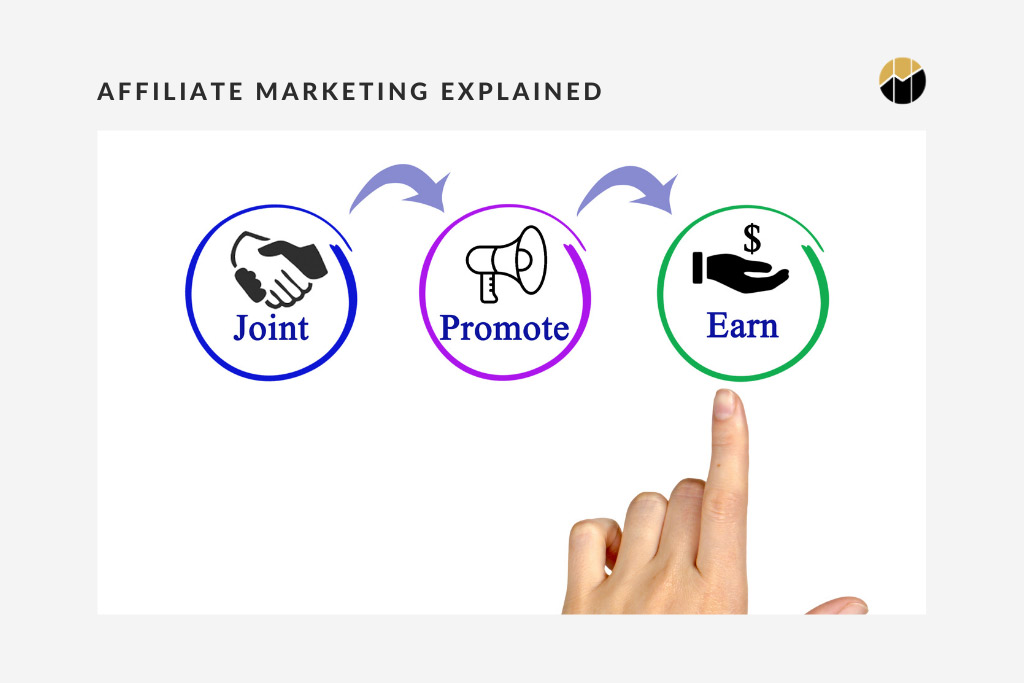
How Do Affiliate Marketers Get Paid?
Affiliate marketing can be a quick and inexpensive method of making money online, without the “hassle” of actually selling physical products.
The attractiveness is undeniable for those looking to increase their income. But, how does an affiliate get paid after linking the seller to the consumer?
Since the affiliate’s contribution to the seller’s sales can be measured in three ways, the affiliate can get paid in three ways:
- Per sale.
- Per lead.
- Per click.
Let’s have a look at each option:
1. Pay per Sale
This is the standard affiliate marketing structure.
In this type of agreement, the merchant pays the affiliate a percentage of the sale price of the product after the consumer purchases the product.
2. Pay per Lead
Pay per lead affiliate programs compensates the affiliate based on the conversion of leads.
The affiliate must persuade the consumer to visit the merchant’s website and complete the desired action.
This could be filling out a contact form, signing up for a trial, subscribing to a newsletter, downloading a guide, etc.
3. Pay per Click
This option focuses on incentivizing the affiliate to redirect consumers from their marketing platform (social media channel, blog, etc) to the merchant’s website.
This means the affiliate must engage the consumer to the extent that they will move from the affiliate’s site to the merchant’s site.
As a result, the affiliate is paid based on the increase in web traffic.
Read also: Affiliate Marketing Income – Commissions & Realistic Earnings.
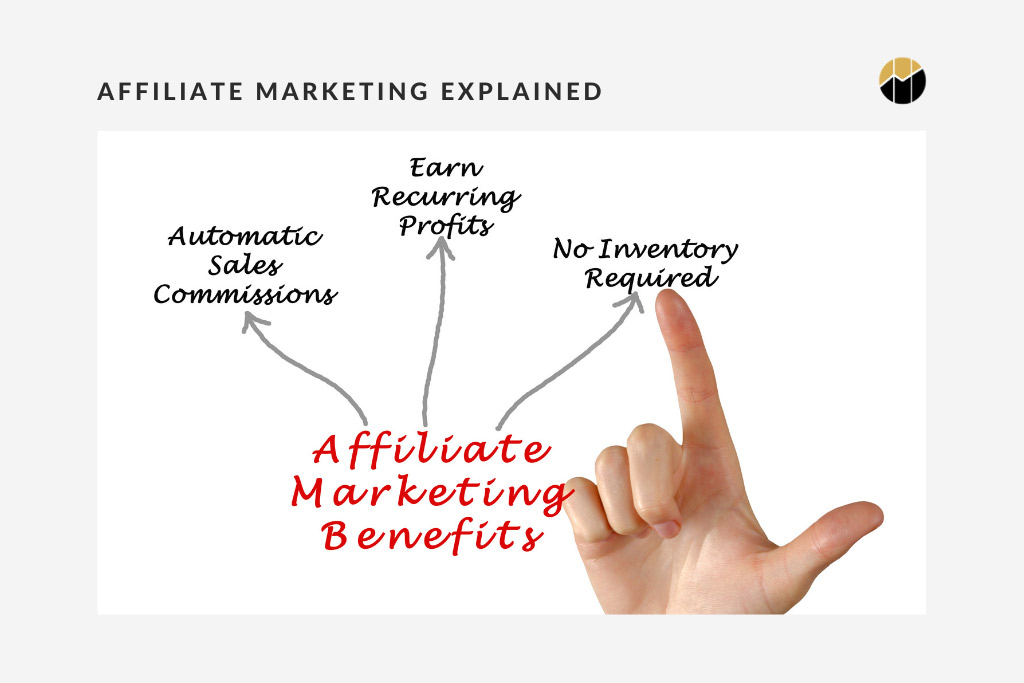
Affiliate Marketing Benefits
So, the question you are probably asking yourself now is… Why be an affiliate marketer? What are the benefits of affiliate marketing?
Here are 7 reasons to become an affiliate marketer:
1. Automatic Sales Commissions
While any “regular” job requires you to be at work to make money, with affiliate marketing you can make money while you sleep.
But even just saying that out loud sounds skeptical, right?
Let me explain.
After you have invested time and money to set up your website and marketing campaigns for promoting a series of merchants’ products, you can see continuous returns in the form of “automatic” sales.
I am not saying that you set it up once, and you forget about it. But, one marketing campaign or blog post can continue to perform and provide you with revenue without having to re-do the process. When you get it to work, you essentially only have to optimize from time to time.
That’s why it’s a business model where you can continue to receive money for your work long after it’s “done”.
2. Earn Recurring Profits
In the same way that you can continue to earn money from one blog post that contains an affiliate link, you can also earn recurring commissions if the product you are promoting is subscription-based.
This is based on the terms of the affiliate agreement, but typical examples of these are software subscriptions.
3. No Inventory Required
The beauty of the affiliate marketing model is that there’s no product inventory required.
Forget about sourcing products, inspecting the manufacturing process, shipping the products to your warehouse and then providing shipping to your customers.
There’s nothing wrong with e-commerce or drop-shipping business models, but it does require extra capital and logistics to run.
4. No Customer Support
Individual sellers and companies offering products (digital and physical) or services need a customer support system or team.
The affiliate marketing business model doesn’t necessarily require offering customer support. An affiliate marketer’s job is to link the merchant’s offer with a consumer while keeping the consumer’s best interest at heart.
The merchant that you are promoting takes care of the customer service for you… well, it’s in their best interest to provide for their customers’ satisfaction.
5. Cost-Effective
I’m not talking about just inventory. Most businesses require startup fees as well as the cash flow to finance the products or services being sold.
However, you can start an affiliate marketing business with a low startup cost. There are some digital tools that you will need to invest in, but the costs of those are lower than the infrastructure needed to run other online or brick-and-mortar businesses.
6. Performance-Based Rewards
In a regular job, you could work extra hours every week and still earn the same salary.
As an affiliate marketer, your earnings are based on your performance. This is a benefit, but it could turn into a disadvantage when you spend your time and money in the wrong things.
That’s why it’s important to hone your skills in copywriting, marketing and business mindset to create engaging campaigns or write valuable content that will translate to more sales.
Then, you will get paid for the outstanding work you do!
7. Work Flexibility
Work whenever you like, from wherever you like.
If you are looking to quit your 9 to 5 job, affiliate marketing can offer flexibility in hours (and the option of determining your own working hours) and the convenience to work from home.
Since you are becoming your own boss, you have the independence to set up the goals that matter to you in order to achieve your life vision.
You can promote and talk about solutions that align with your values. And when you are ready to scale, you can work with people you value.
Read also: Affiliate Marketing Pros and Cons – Is It Worth It?
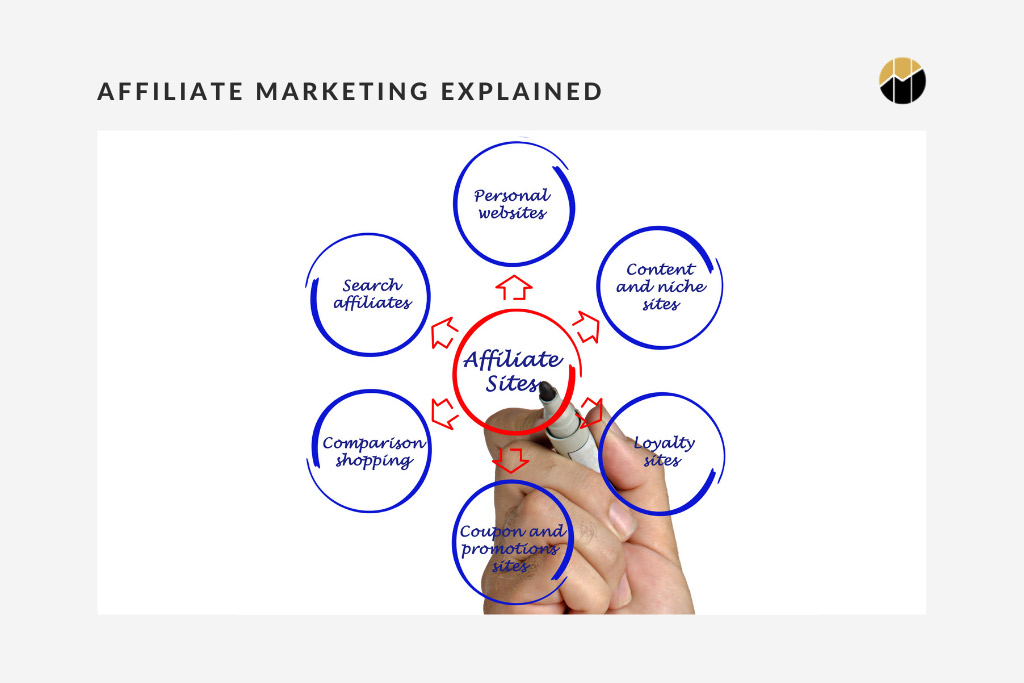
Affiliate Marketing Website Examples
An affiliate website can be:
- Personal websites.
- Content and niche site.
- Loyalty sites.
- Coupon and promotion sites.
- Comparison shopping websites.
- Search affiliate sites.
If you are wondering what affiliate websites look like, here are some affiliate marketing website examples:
- Money-Saving Expert: This is an example of an affiliate site that has become an authority site. It offers actionable advice on the personal finance niche. They make their affiliate commissions by linking out in their posts and pages to affiliate products they have agreements with.
- Dating Advice: This affiliate site makes money by promoting their affiliate links to different dating apps and websites (like Match and eHarmony).
- Buzzfeed: This site started out as a gift guide and expanded into reviews of various product categories.

